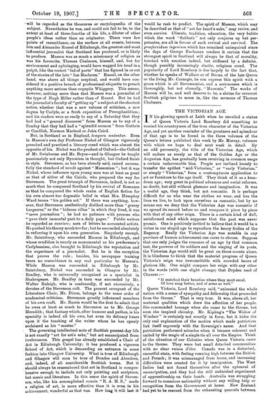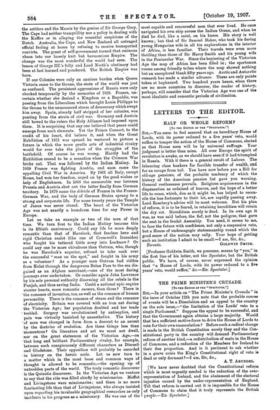THE VICTORIAN AGE.
IN his glowing speech at Leith when he unveiled a statue of Queen Victoria Lord Rosebery did something to remind his countrymen of the true character of the Victorian Age, and yet another reminder of the greatness and splendour of that age is to be found in the three volumes of the Queen's letters published this week by Mr. Murray, volumes with which we hope to deal next week in detail. AY an odd perversity, the title of the Victorian Age, which will endure as surely as that of the Golden Age or the Augustan Age, has gradually been receiving in common usage a certain unfavourable bias. People are inclined loosely to transfer the epithet "mid-Victorian," or "early Victorian," or simply "Victorian," from a contemptuous application to art or furniture to the age itself. They think of it as a hum- drum age ; very great in political advances and social reforms, no doubt, but still without glamour and imagination. It was a useful age, they think, but not romantic. It is perhaps difficult for us who wear the clothes we wear, and live the lives we live, to look upon ourselves as romantic, but by no means can we deny that the Victorian Age was romantic if we spread its record before us and compare it piece by piece with that of any other reign. There is a certain kind of dull, uninformed mind which supposes that the past was never prosaic. One is positively invited to believe that it would be a virtue in our stupid age to reproduce the heavy frolics of the Regency. Really the Victorian Age was notable in any province of human achievement one cares to choose. Suppose that one only judges the romance of an age by that common test, the prowess of its soldiers and the singing of its poets, the Victorian Age would still be great on those counts alone. It is blindness to think that the material progress of Queen Victoria's reign was irreconcilable with crowded hours of glorious life. One might compare her reign with any other in the words (with one alight change) that Dryden used of Chaucer :—
"It matched their beauties where they most excel, Of love sang better, and of arms as well."
Queen Victoria, Lord Rosebery said, "animated the whole nation with a sense of sympathy and fellowship that proceeded from the throne." That is very true. It was, above all, her maternal qualities which drew the affection of her people. She commanded homage when she came to the throne, but soon she inspired chivalry. Mr. Kipling's "The Widow of Windsor" is certainly not courtly in form, but it hides the only real explanation of the motive which made patriotism
link itself expressly with the Sovereign's name. And that patriotism performed miracles when it became coherent and united by the magic of a single tie all over the Empire. Think of the situation of our Colonies when Queen Victoria came to the throne. They were but small detached communities with no clear raison d'être. Canada was in a disturbed, unrestful state, with feeling running high between the British and French ; it was mismanaged from home, and increasing difficulties were created for it by immigration. The West Indies bad not found themselves after the upheaval of emancipation, and they had the still unfinished experiment of apprenticeship on their hands. Australia was struggling forward to conscious nationality without any willing help or recognition from the Government at home. New Zealand had yet to be rescued from the exhausting quarrels between
the settlers and the Maoris by the genius of Sir George Grey. The Cape had neither tranquillity nor a policy in dealing with the Kaffirs or in allaying the resentful suspicions of the Dutch. Australia, the Cape, and New Zealand all outraged official feeling at home by refusing to receive transported convicts. The grant of self-government turned that ominous chaos into our loosely knit but harmonious Empire. The change was the most wonderful the world had seen. The lesson of George folly and Lord North's obstinacy had been at last learned and pondered. The British Empire was born.
If our Colonies were only an anxious burden when Queen Victoria came to the throne, the state of the world was just as confused. The persistent aggressions of Russia were only checked temporarily by the memories of 1828. France, un- certain whether she desired a Kingdom or a Republic, was passing from the Liberalism which brought Louis Philippe to the throne to the unmeasured storm of democracy which swept him away. Spain, already half stripped of her colonies, was panting from the strain of civil war. Germany and Austria still bowed to the rulers the Holy Alliance had imposed upon them. It is surprising that any one believed that peace could emerge from such elements. Yet the Prince Consort, to the credit of his heart, did believe it, and when the Great Exhibition of 1851 was opened he ventured to picture a future in which the more gentle arts of industrial rivalry would for ever take the place of the struggles of the battlefield. Of course he was wrong. Hardly had the Exhibition ceased to be a sensation when the Crimean War broke out. That was followed by the Indian Mutiny. In 1859 France was fighting Austria, and soon came the appalling Civil War in America. By 1861 all Italy, except • Rome, had won her freedom, urged on by the good wishes or help of Englishmen. In 1866 the memorable war between Prussia and Austria shut out the latter finally from German territory. In 1870 came the debacle of France in the Franco- German War, and the body of German States sprang to a • strong and corporate life. For some twenty years the Temple of Janus was never closed. The heart of the Victorian Age was not exactly a humdrum time for any Power in Europe.
Let us take an example or two of the men of that time. We turn first to the Indian Mutiny because this is its fiftieth anniversary. Could any life be more deeply romantic than that of Havelock, that fearless hero and rigid • Christian zealot (like one of Cromwell's Ironsides) who fought his tattered little army into Lucknow ? Or could any one be more chivalrous than Outram, who, though he was Havelock's superior, refused to take rank over the successful "man on the spot," and fought in his army as a volunteer ? As a younger man Outram had ridden from Kelat through the dangerous Bolan Pass to the sea dis- guised as an Afghan merchant,—one of the most daring • journeys ever undertaken. Or consider again John Lawrence by his sole personal authority disarming all the rebels in the Punjab, and thus saving India. Could a national epic require stouter hearts, more romantic careers, than those ? There is • the romance of invention, too, as well as the romance of human personality. There is the romance of steam and the romance of electricity. Britain was covered with an iron net during the Victorian Age ; her population doubled and her trade • trebled. Surgery was revolutionised by antiseptics, and pain was virtually banished by anaesthetics. The history ' of matt was changed in form from a descent to an ascent by the doctrine of evolution. Are these things less than momentous ? On literature and art we must not dwell, nor on the great statesmen of the Victorian Age,—on that long and brilliant Parliamentary rivalry, for example, between such conspicuously different characters as Disraeli and Gladstone. Their opposition will probably be recorded in history on the heroic scale. Let us now turn to a matter which in the most loose and common ways of thought is allowed to be romantic,—the opening up, of untrodden parts of the world. The truly romantic discoverer is the Quixotic discoverer. In the Victorian Age we venture to say that the role was filled chiefly by missionaries. Moffat and Livingstone were missionaries; and there is no more fascinating life than that of Livingstone, who always insisted upon regarding his invaluable geographical researches as only incidents in his progress as a missionary. He was one of the
most capable and resourceful men that ever lived. He once navigated his own ship across the Indian Ocean, and when be died he died, like a saint, on hie knees. His story is well known ; but that of Sir Samuel Baker, who took his daring young Hungarian wife in all his explorations in the interior of Africa, is less familiar. Their travels were even more thrilling than those of Sir Harry Smith and his young wife in the Peninsular War. Since the beginning of the Victorian Age the map of Africa has been filled in; the sportsman roams among friendly tribes where the map showed nothing but an unexplored blank fifty years ago. Arctic and Antarctic research has made a similar advance. These are only points taken at haphazard. Two hundred years hence, when there are no more countries to discover, the reader of history, perhaps, will consider that the Victorian Age was one of the most idealistic and romantic periods of civilisation.











































 Previous page
Previous page